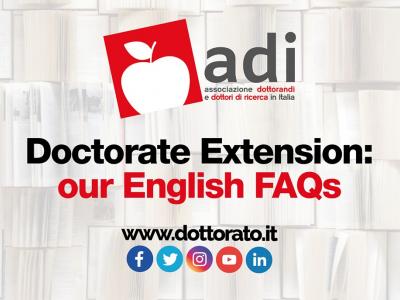
On May 21st, the “Decreto Sostegni” was signed into law, after being published in the “Gazzetta Ufficiale”. As already anticipated, article 33 allows PhD candidates of the current cycles to ask for an extension of no more than three months, according to the clauses 2-bis, 2-ter and 2-quater, which we report in full:
- 2-bis. In order to allow a timely and effective rescheduling of research activities and to guarantee the right quality and maturity of the related projects, suspended because of the epidemiological emergency from COVID-19, the PhD candidates holding scholarships pursuant to and by the effect of the decree 45/2013 of the Italian Minister of Education, University and Research, and of article 4 of law n. 210/1998, may ask for an extension of the final term of the course, not exceeding three months, with consequent disbursement of the scholarship for the corresponding period.
- 2-ter. The extension referred to in clause 2-bis can also be requested by PhD candidates who are not recipients of scholarships, as well as by public employees on leave for the frequency of a PhD. In the latter case, it is up to the public administration to which they belong to extend the leave for a period equal to that of the extension of the doctoral course.
- 2-quater. For the purposes referred to in clause 2-bis, the Fund for the ordinary financing of universities, referred to in article 5, paragraph 1, letter a), of the law of 24 December 1993, n. 537, is increased by 61.6 million euros for the year 2021.
While waiting for the universities to implement the law and start the procedures for submitting the request, we have prepared our FAQs.
FREQUENTLY ASKED QUESTIONS
1) I do not intend to apply for the extension. Is it mandatory?
It’s not mandatory. The extension is optionally requested by the PhD candidates. Those who do not need it or do not intend to use it, are allowed not to request it.
2) I am a PhD candidate without a scholarship. Can I apply for the extension?
Yes, the extension is also aimed at those who do not benefit from the scholarship. In this case, you will be entitled to the extension of three months, but not to the disbursement of the scholarship. The same procedure was followed for the extensions of the 33rd cycle.
3) I am a Public Administration employee on leave. Can I apply for the extension?
Yes, the provision is also addressed to Public Administration employees on leave. It will be up to the Public Administration to which they belong to extend the period of leave.
4) I am a PhD candidate of the 33rd cycle and I have not finished my PhD yet; I have not taken advantage of the previous extensions, because of suspension when the previous provisions were issued. Can I apply for the extension?
The law does not refer to a particular cycle, so there are no impediments to its extension to the rather limited number of enrolled in the 33rd cycle that are still in progress at the time of its publication in the “Gazzetta Ufficiale”.
5) I am enrolled in an industrial doctorate, can I apply for the extension?
Yes.
6) I have an ESF-funded PhD scholarship, can I apply for the extension?
Yes.
7) I have a scholarship financed with POR / FSE (industrial doctorate with regional scholarship), can I apply for the extension?
Yes.
8) I am a PhD candidate at a private university, can I apply for the extension?
Yes. All Italian Universities are required to grant the extension. However, being unable to use state funding, private universities are not obligated to grant a paid extension, so you may only be entitled to an unpaid extension.
9) I am enrolled in a doctorate co-financed by private institutions. Will the government also take charge of the private-financed shares?
No, the funding will relate only to the share of state competence.
10) My PhD scholarship is funded by a foreign state / foundation / institution. Can I apply for the extension?
No, the funding relates to PhD scholarships granted by Italy.
11) Can the university and / or the doctoral college refuse to grant the extension?
Universities cannot refuse to grant the extension, but they will have to apply the law. The board alone, which is usually entitled to evaluate the reasons given for the extension, could refuse or reduce it, but only after a careful evaluation and with a detailed motivation.
12) When can I apply?
The provision entered into force on 21st May with the publication in the “Gazzetta Ufficiale” of the law 61/2021 (which is the DL Sostegni signed into law). Each University must take this into account and is free to choose how to inform its PhD candidates and how to make them apply for the extension. If the time is too long, please contact the closest ADI branch to report the problem.
13) I am a PhD candidate with a scholarship and I can apply for the DIS-COLL (i.e. unemployment benefit), being an Italian citizen or having a residence permit for work reasons. When will I have to apply for the DIS-COLL? At the regular end of the doctorate or at the end of the extension?
The DIS-COLL (for those who are eligible) can be requested starting from the day following the conclusion of the doctoral contract, therefore *including the three-month extension *. For example, PhD candidates of the 34th cycle who finish their doctorate on the 30th of September, if they take advantage of the three-month extension, will have their doctoral term postponed to the end of December and will be able to apply for the DIS-COLL starting from the beginning of January 2022. For more information, see our Guide to DIS-COLL.
Pubblicato Mer, 02/06/2021 - 11:56
- Accedi o registrati per inserire commenti.